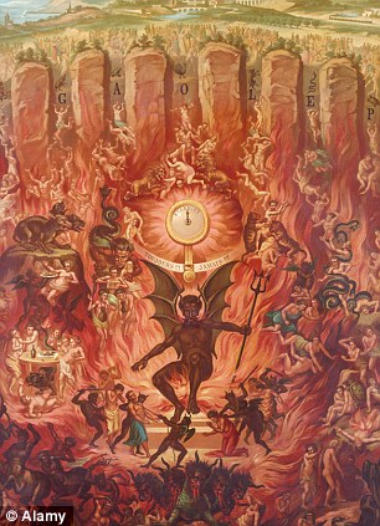A divine deterrent: Populations with a strong belief in
Hell have lower crime-rates, according to study






‘Knowledge is power’





WEB PAGES
OUR OFFERING
UPLOADED ITEMS
OUR EMAIL
kri200@womenspowerbook.org
QUESTION
Raise the vol to listen to the
lady airing awe @ the SINGLE author encyclopedia
World’s
encyclopedic
knowledge
compacted
in
your
hand
Religious belief generally has been viewed as 'a monolithic construct,' Shariff said. 'Once you split religion
into different constructs, you begin to see different relationships.
'In this study, we found two differences that go in opposite
directions. If you look at overall religious belief, these
separate directions are washed out and you don't see
anything. There's no hint of a relationship.'
The new findings, he added, fit into a growing body of
evidence that supernatural punishment had emerged as a
very effective cultural innovation to get people to act more
ethically with each other. In 2003, he said, Harvard University
researchers Robert J. Barro and Rachel M. McCleary had
found that gross domestic product was higher in developed
countries when people believed in hell more than they did in
heaven.
'Supernatural punishment across nations seems to predict
lower crime rates,' Shariff said.
'At this stage, we can only speculate about mechanisms, but
it's possible that people who don't believe in the possibility of
punishment in the afterlife feel like they can get away with
unethical behavior. There is less of a divine deterrent.'
He added, however, that these are correlational data, and so
caution should be taken with the conclusions. Though Shariff
and study co-author Mijke Rhemtulla of the Center for
Research Methods and Data Analysis at the University of
Kansas tried to account for obvious alternative explanations,
more research is needed to explore other interpretations for
the findings.
'This research provides new insights into the potential
influences of cultural and religious beliefs on key outcomes at
a societal level,' said Kimberly Andrews Espy, vice president
for research and innovation.
'Although these findings may be controversial, dissecting the
associations between specific belief systems and epidemiologic behaviors is an important first step for
social scientists to disentangle the complex web of factors that motivate human behavior.'

You might also like:
7 Movies That Put Insane Work Into Details You Didn't Notice
9 Famous Movie Villains Who Were Right All Along
Will There Be a Clash of Civilizations With Islam?



Empowering Book Newsletter






WOMEN’S POWER: ITS PAST, ITS PRESENT, ITS FUTURE: FEMOCRACY


















